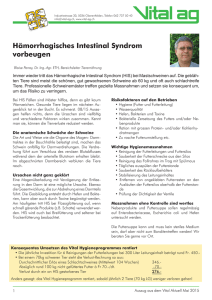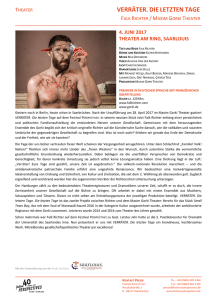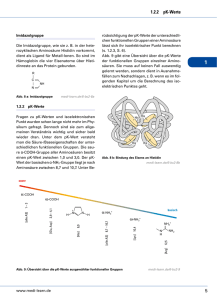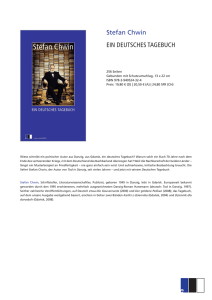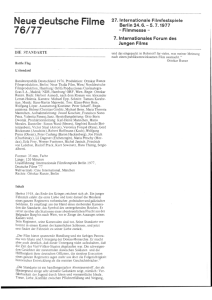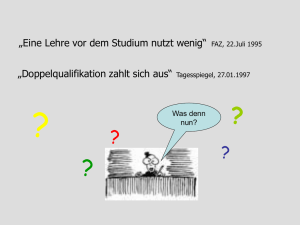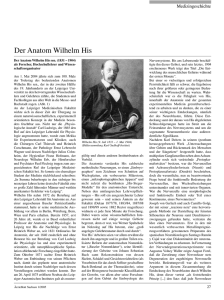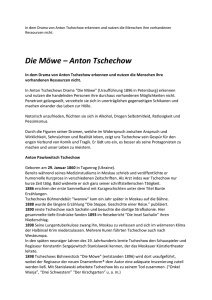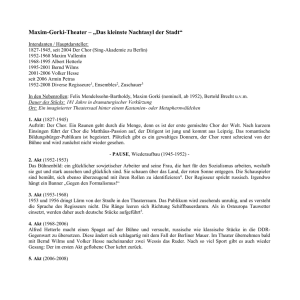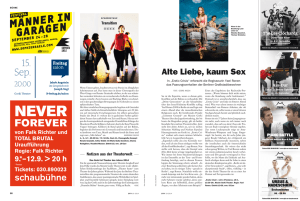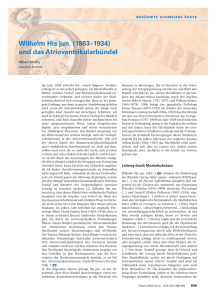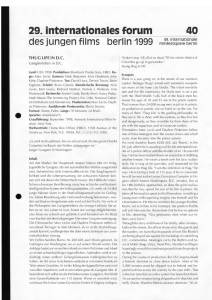Filmmesse - 7. Internationales Forum des Jungen Films
Werbung
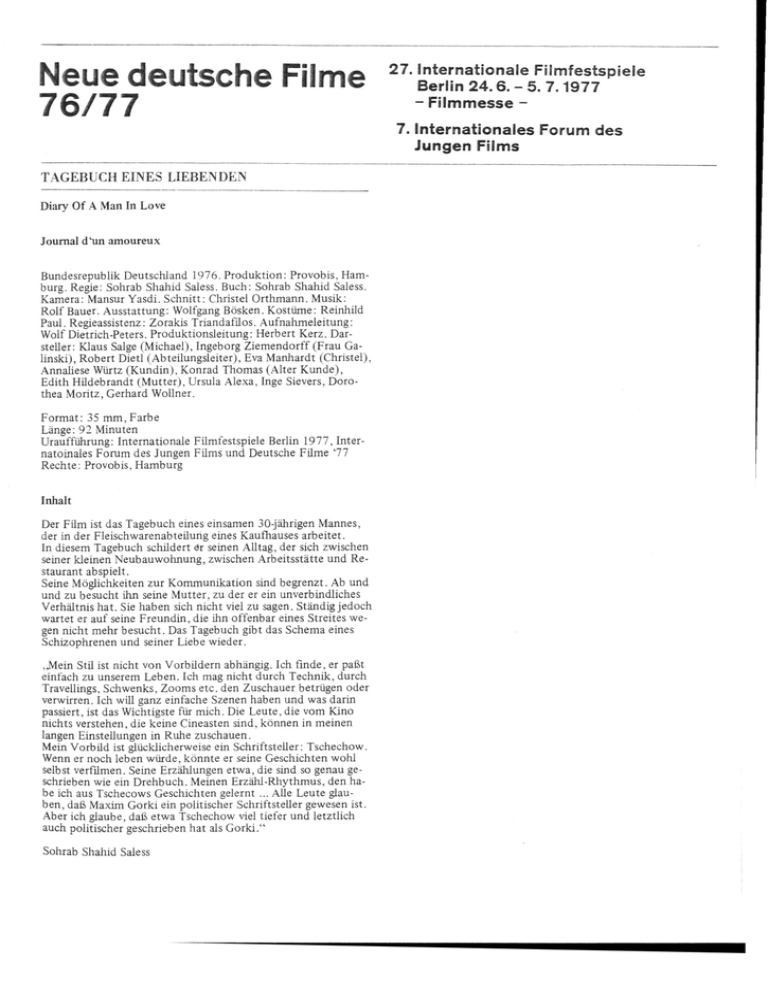
- Filmmesse 7. Internationales Forum des Jungen Films TAGEBUCH EINES LIEBENDEN Diary Of A Man In Love Journal d'un amoureux Bundesrepublik Deutschland 1976. Produktion: Provobis, Hamburg. Regie: Sohrab Shahid Saless. Buch: Sohrab Shahid Saless. Kamera: Mansur Yasdi. Schnitt: Christel Orthmann. Musik: Rolf Bauer. Ausstattung: Wolfgang Bösken. Kostüme: Reinhild Paul. Regieassistenz: Zorakis Triandafilos. Aufnahmeleitung: Wolf Dietrich-Peters. Produktionsleitung: Herbert Kerz. Darsteller: Klaus Salge (Michael), Ingeborg Ziemendorff (Frau Galinski), Robert Dietl (Abteilungsleiter), Eva Manhardt (Christel), Annaliese Würtz (Kundin), Konrad Thomas (Alter Kunde), Edith Hildebrandt (Mutter), Ursula Alexa, Inge Sievers, Dorothea Moritz, Gerhard Wollner. Format: 35 mm, Farbe Länge: 92 Minuten Uraufführung: Internationale Filmfestspiele Berlin 1977, Internatoinales Forum des Jungen Films und Deutsche Filme '77 Rechte: Provobis, Hamburg Inhalt Der Film ist das Tagebuch eines einsamen 30-jährigen Mannes, der in der Fleischwarenabteilung eines Kaufhauses arbeitet. In diesem Tagebuch schildert ör seinen Alltag, der sich zwischen seiner kleinen Neubauwohnung, zwischen Arbeitsstätte und Restaurant abspielt. Seine Möglichkeiten zur Kommunikation sind begrenzt. Ab und und zu besucht ihn seine Mutter, zu der er ein unverbindliches Verhältnis hat. Sie haben sich nicht viel zu sagen. Ständig jedoch wartet er auf seine Freundin, die ihn offenbar eines Streites wegen nicht mehr besucht. Das Tagebuch gibt das Schema eines Schizophrenen und seiner Liebe wieder. „Mein Stil ist nicht von Vorbildern abhängig. Ich finde, er paßt einfach zu unserem Leben. Ich mag nicht durch Technik, durch Travellings, Schwenks, Zooms etc. den Zuschauer betrügen oder verwirren. Ich will ganz einfache Szenen haben und was darin passiert, ist das Wichtigste für mich. Die Leute, die vom Kino nichts verstehen, die keine Cineasten sind, können in meinen langen Einstellungen in Ruhe zuschauen. Mein Vorbild ist glücklicherweise ein Schriftsteller: Tschechow. Wenn er noch leben würde, könnte er seine Geschichten wohl selbst verfilmen. Seine Erzählungen etwa, die sind so genau geschrieben wie ein Drehbuch. Meinen Erzähl-Rhythmus. den habe ich aus Tschecows Geschichten gelernt ... Alle Leute glauben, daß Maxim Gorki ein politischer Schriftsteller gewesen ist. Aber ich glaube, daß etwa Tschechow viel tiefer und letztlich auch politischer geschrieben hat als Gorki." Sohrab Shahid Saless Synopsis: The film is the diary of a lonely 30-year-old man who works as a salesman in the cooked meats department of a big store. The diary reflects his everyday life — his small appartment in a new block of flats, his job and the restaurant where he eats — that is all. He has little chance to communicate with others. From time to time he is visited by his mother, with whom he has a rather strained relationship. They have nothing much to say to one another. However, he is always waiting for his girlfriend who seems not to want to visit him any more, perhaps because of a quarrel. The diary gives a picture of a schizophrenic and of his ability to love. Comments from the Director: ,JVIy style does not depend un preconceptions. I find that it matches our lives. I don't want to use technology — travelling shots, pans or zooms to deceive or to confuse the viewer. What is important for me is to have scenes which are very simple, with simple things happening in them. People who understand nothing about the cinema, who aren't cinéastes, can feel at home with the long focus I use. Fortunately my model is a writer: Chekhov. If he were still alive he might well make films of his stories. They are so exactly described that they might be shooting scripts. My narrative rhythm is something I learned from Chekhov ... Everyone thinks that Maxim Gorki was a proletarian writer, but I think that Chekhov's writings are deeper, and ultimately more political as well, than those of Gorki." Sohrab Shahid Saless Le Sujet: Le film est le journal d'un homme solitaire âgé de 30 ans, qui travaille dans le rayon charcuterie d'un grand magasin. Dans ce journal, il raconte sa vie quotidienne, qui se déroule entre son petit appartement moderne, sa place de travail et le restaurant. Il a peu de possibilités d'entrer en contact avec d'autres personnes. De temps en temps, il rend visite à sa mère, avec laquelle il entretient des relations sans passoin. Ils n'ont pas beaucoup de choses à se dire. Il attend constamment son amie, qui ne lui rend plus visite, à cause d'une querelle. Le journal reproduit le schéma d'une schizophrénie et de son amour. Le Metteur en scène sur son film: „Mon style ne dépend pas des idéaux. A mon avis, il va simplement avec ma vie. Je n'aime pas duper ou rendre confus le spectateur au moyen de la technique, des changements de tableaux, des ,700ms" etc. Je veux avoir des scènes toutes simples, et ce qui s'y passe, cela m'est le plus important. Les gens, qui ne connaissent rien du cinéma, qui ne sont pas des cinéastes, peuvent regarder tout tranquillement et longuement mes images. Mon idéal est heureusement un écrivain: Tschechow. S'il vivait encore, il pourrait porter lui-même ses essais â l'écran. Ses nouvelles par exaemple, sont écrites comme un scénario. Les gens croient que Maxim Gorki était un écrivain politique. Mais je crois que Tschechow a écrit d'une manière beaucoup plus profonde et finalement plus politique." Biofilmographie Sohrab Shahid Saless, geboren am 28.6.1944 in Teheran. Nach ersten Studienjahren im Iran 1963 bis 1967 Studium der Regie und Dramaturgie an der Schauspielschule in Wien unter Professor Kraus. 1965 bis 1967 gleichzeitig immatrikuliert an der Schule für Film- und Fernsehgestaltung in Wien. Danach einjähriger Besuch des Conservatoire indipendant du Cinema in Paris. Von 1968-1974 im Iran als Filmregisseur beim Ministerium für Kultur und Kunst tätig; in dieser Zeit 22 Kurz- und Dokumentarfilme. Erster Spielfilm 1973. Gründet 1974 mit einer Gruppe junger Leute die „Neue Filmgruppe", die auf Coop-Basis zusammenarbeitet. Ab 1975 in Berlin. Yek ettefaghe sadeh (Ein einfaches Ereignis; 1973), Tabiate bijan (Stilles Leben; 1974), In der Fremde (1973),Reifezeit (1975), Tagebuch eines Liebenden (1976) Herausgeber: 27. Internationale Filmfestspiele Berlin (Berlin 15, Bundesallee 1-12) Redaktion: Helmut W. Banz 7. Internationales Forum des Jungen Films (Berlin 30, Weiserstraße 25/Kino Arsenal) Redaktion: Alf Bold, Erika Gregor Satz: Zitty Verlag GmbH Druck: Oktoberdruck
